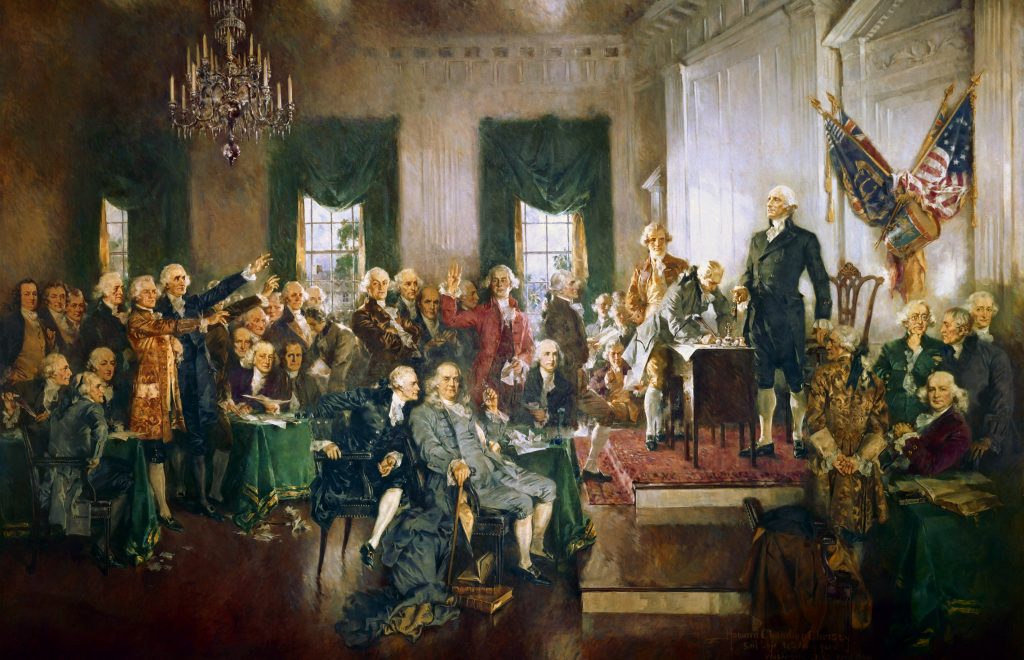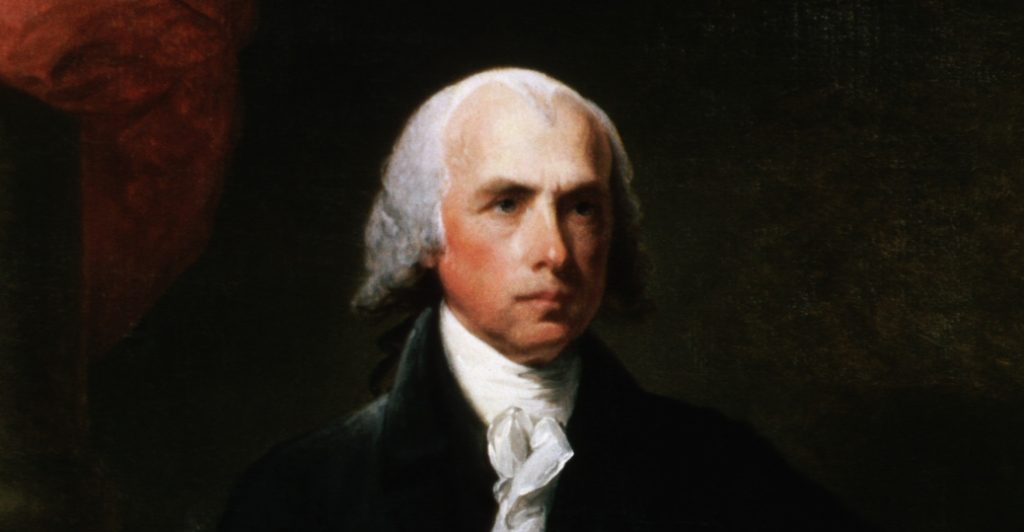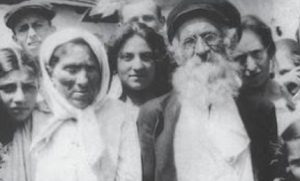There are a number of inconsistencies in the writings of James Madison. Some of those inconsistencies regard states’ rights, the importance of having a bill of rights in the U.S. constitution, and the appropriate size of government.1 One of the inconsistencies that have troubled scholars of Madison is his beliefs on the appropriate extent of popular participation in government. Scholars have addressed this issue in a couple of different ways. Citing his Party Press Essays, some argue that Madison approved of large popular participation.2 Others argue that this type of approval was only on the condition that the majority meet educational, economic, and other standards.3 While Madison’s writings suggest that he could not be anything less than a champion of democracy, his actions at the Constitutional Convention do not uphold this view. Madison sought to strip away the sovereignty of the majority (free, white men) because he distrusted them for many reasons. He also doubted their ability to direct government. Furthermore, he blamed them for the state of the Articles of Confederation and its inability to deal with its own problems efficiently. This combination led him to disapprove of democracy and to oppose the creation of a government that allowed ordinary citizens to wield a meaningful amount of power in government.4
Scholar Neal Reimer correctly argues that Madison did indeed express favor for popular participation in government in his Federalist Essays and Party Press Essays. Madison wrote that, “Public opinion… is the real sovereign in every free [government]” and that citizens should not abide by a rule they do not have any say in.5 But this was not Madison’s complete stance on democracy.
When Madison speaks of popular participation in his article “Public Opinion,” for example, he is not talking about the majority of his own time. He is talking about an enlightened, dispassionate, and interconnected majority: the appropriate majority for a smooth working, just, and free government; that is, someone who embodied the ideals of Republican virtue. Education was not wide-spread at the time, so the majority of Americans in 1787 was not as educated as the majority he supposed in Federalist No. 39. Lacking this education would cause the majority of his day to make decisions in government that were not favorable or in the best interest of the Confederation. The majority of Madison’s time was also not as interconnected as he would have preferred them to be; news and ideas traveled slowly, and the vast and scarcely populated land of North America did not bring people together. This caused a lack of cohesion in ideas, which resulted in a large amount of disagreement that thwarted government from moving forward with reasoned decisions. Also, the disparity between the majority’s and the elite’s access to resources was too great. This would lead to a passion-fueled abuse of power by the majority.
For Madison, education, interconnectedness, cohesion, and economic capacity were important qualities that a majority had to have in order to responsibly wield power in their government.6 These would safeguard against the abuse of governmental power and other vices, as well as create more cohesion among citizens to move government along.7 The majority of his time did not possess these qualities, and for this reason as well as the current state of the Confederation, he argued in favor of the Virginia Plan.

The Virginia Plan sought to bolster the power of the federal government by giving it the power to negate state laws that contradicted with federal laws. This not only limited the sovereignty of the states, but the sovereignty of the people as well. This was a favorable plan to Madison, because he observed that the Articles of Confederation did not give the federal government enough power to protect and govern the Union efficiently. This lack of federal power is what Madison attributed to the failure of the Articles of Confederation.8
The abundance of power that states held was also to blame for the failure of the Articles of Confederation. The states lacked cohesion, and the people from whom they derived their power were to blame. Taking power away from them would make the federal government more efficient, and limiting states’ rights would help accomplish that.9 This is what Madison was most concerned with. It seemed that he understood that the creation of this new constitution would be the solution to this inefficient and divided union.10 Otherwise, preserving states’ and citizens’ power or voice in government would be simply recreating another Articles of Confederation and its problems.
It is acknowledged that Madison was not only skeptical of the majority, but of government officials as well. He wrote in his Federalist No. 39 that democracy would be a safeguard against abuse by government officials.11 And what he meant by democracy in this context was popular participation by the poor white majority of men. But, in the end, Madison had more confidence in elites like himself and government officials that he disregarded this view and advocated for the Virginia Plan. Furthermore, in the same paper, he explicitly suggests that indirect participation would be just as much of a safeguard against abuse by government officials as direct participation would be, writing, “It is sufficient . . . that persons administering [the government] be appointed, either directly or indirectly, by the people.”12 Here Madison shows a willingness to decrease the voice of ordinary citizens in government and not that of government officials.
Aside from his distrust of the majority, Madison believed that the appropriate role of citizens was simply to defend the Constitution.13 Initially, Madison did not favor a Bill of Rights in the Constitution. His understanding of the importance of a Bill of Rights was not in line with the “traditional theory” that the Bill of Rights would protect the majority from the government. Madison would later push for the Bill of Rights for two reasons, both of which do not seek to bolster popular participation.
First, Madison believed that a Bill of Rights would protect the interests of people like him: the elite minority. In a popular government, he believed there was a constant threat that the majority would succumb to their vices. He believed that they would use their influence in government to strip the minority class of their property and liberty. A Bill of Rights would serve as a safeguard for the minority class more than for the majority against government.14
Second, Madison saw an opportunity in the inclusion of a Bill of Rights to further decrease the influence of the majority. If the majority were granted a set of rights to safeguard against government, this would turn into their primary concern. Then, the majority would be inclined not to direct government, but just to protect their rights. The point here is that the Bill of Rights would ultimately serve as a distraction more than a protective measure for the majority.
Madison’s involvement in the creation of the Constitution was not objective. He was subjective and inclined toward advocating for positions that protected, if not furthered, his interests and those of others like him. Madison was a privileged young man growing up; his family was affluent and owned a good deal of land. Liberty and property were some of his main concerns. In a popular government, the majority would be the elite class’ largest threat. There is little to suggest that Madison would be most concerned with the plight of the majority rather than with the interests of the elite. Current events, in addition, made him worry about his property.15
Colleen Sheehan argues that this type of interpretation of Federalist No. 10 is incorrect based on Madison’s “Notes on Government.”16 She argues that his notes suggest he is approving of this large majority’s participation in government and that critics of Madison have taken this paper out of context. But it is Sheehan’s argument that is out of context. Madison wrote these notes on government, as she mentions, in response to theoretical writers’ arguments that say a republic can only work in a small society. This argument does not address the issues of the majority that Madison addressed in his Public Opinion and Federalist no. 39. The issues of the majority that Madison addressed in his Public Opinion, and in Federalist No. 39, was that of whether or not the majority had the capacity to direct government. In these essays, Madison does not have a problem simply with the size of the group participating in government, but with the majority’s capabilities. Madison also addressed whether or not the majority possessed civic virtue.
With all of these factors considered, Madison’s approval of popular participation was indeed conditional, as Gabrielson argues. For the majority to exercise a great deal of participation, they must be enlightened, virtuous, dispassionate, cohesive, and economically up to par. But his majority then was largely uneducated, they were spread out on the vast American land, and the economic gap between the elite and the masses was great. Since the majority of his day did not possess these qualities, they were not capable of directing government. The failure of the Articles of Confederation further supported this view of the majority. For these reasons, he believed that the appropriate extent of popular participation then should be limited to protecting the Constitution instead of directing government.17 This way, the state of the Confederation could be properly addressed. The federal government could better address the problems of the Confederation with more independence from the influence of the majority. Lastly, the rights of the elite would meet a less severe threat from the passions of a majority that was easily susceptible to dissatisfaction and other vices.
- For scholarship on Madison’s inconsistencies, see Neal Riemer, “Republicanism of James Madison,” Political Science Quarterly 69, no. 1 (1954): 45-64, and Teena Gabrielson, “James Madison’s Psychology of Public Opinion,” Political Research Quarterly 62, no. 3 (2009): 431-444. ↵
- Colleen Sheehan, “Madison’s Party Press Essays,” Interpretation: A Journal of Political Philosophy 3, no. 177 (1990): 355-377. ↵
- Teena Gabrielson, “James Madison’s Psychology of Public Opinion,” Political Research Quarterly 62, no. 3 (2009): 431-444. ↵
- For example, see Jack N. Rakove, James Madison and the Creation of the American Republic (New York: HarperCollins Publishers, 1990), 53-69. At the Constitutional Convention, Madison argued in favor of the Virginia Plan that would allow the federal government to overrule any state law that contradicted with federal laws. This measure would limit the voice of citizens in their government. ↵
- James Madison, “Public Opinion,” National Gazette, December 1, 1791. For similar sentiments from Madison, see James Madison, “Federalist no. 39: Conformity of the Plan to Republican Principles,” Independent Journal, January 16, 1788. Madison wrote, “Public opinion… is the real sovereign in every free government.” ↵
- Teena Gabrielson, “James Madison’s Psychology of Public Opinion,” Political Research Quarterly 62, no. 3 (2009): 431-444. Gabrielson makes this point and lists these as the conditions under which Madison would approve of democracy. ↵
- For examples of the vices of the majority, see James Madison, “Federalist no. 10: The Utility of the Union as a Safeguard Against Domestic Faction and Insurrection,” Daily Advertiser, November 22, 1787. ↵
- Jack N. Rakove, Declaring Rights: A Brief History with Documents, (New York: St. Martin’s Press Inc., 1998), 102-103. ↵
- Jack N. Rakove, James Madison and the Creation of the American Republic (New York: HarperCollins Publishers, 1990), 53-69. ↵
- Jack N. Rakove, James Madison and the Creation of the American Republic (New York: HarperCollins Publishers, 1990), 53-69. ↵
- James Madison, “The Federalist No. 39,” Independent Journal, January 16, 1788. ↵
- James Madison, “The Federalist No. 39,” Independent Journal, January 16, 1788. ↵
- Teena Gabrielson, “James Madison’s Psychology of Public Opinion,” Political Research Quarterly 62, no. 3 (2009): 434-435. ↵
- Jack N. Rakove, Declaring Rights: A Brief History with Documents, (New York: St. Martin’s Press Inc., 1998), 100. ↵
- Edward McNall Burns, James Madison: Philosopher of the Constitution (New Brunswick: Rutgers University Press, 1938: 1-69. ↵
- Colleen A. Sheehan, “The Politics of Public Opinion: James Madison’s ‘Notes on Government’,” The William and Mary Quarterly 49, no. 4 (1992): 614-616. ↵
- Teena Gabrielson, “James Madison’s Psychology of Public Opinion,” Political Research Quarterly 62, no. 3 (2009): 434-435. ↵



49 comments
Aaron Sandoval
This article was really well written, the author did a great job at making this article informative enough that it explains the topic well and enjoyable enough that it didn’t feel like it dragged. I believe this article did a good job of showing Madison’s thought process on deciding how the government should be run, whether it was by the people as a majority or by the elite who would vote on behalf of the majority
Ariette Aragon
I really enjoyed reading your article and was very intrigued by what you wrote in your article. It was interesting to see some inconsistencies in one of the most influential men in U.S history’s views and beliefs. Sadly, the founding fathers have underlying motives. Finally, I’d like to mention that the pictures you provided supported well your writing and helped me get a clear mental image.
Kensley Dieckow
I really liked your take on James Madison. Many of us learn in high school that he was a poster child for democracy and popular sovereignty. After reading your article you put into perspective Madisons personal beliefs and how he wasn’t making decisions that would help the majority of Americans. I like how you touch on all of the writings he was involved with and how they affected American elites.
Eliana Villarreal
This was a great read about James Madison! I really liked the use of your sources throughout the article. In one paragraph, you presented one interpretation of his writings and then another interpretation in the next paragraph which goes to show that his actions spoke more for themselves than his words did at the time. After reading this article that argues both sides of why Madison did what he did to fight for a strong central government, it is clear to me that decisions were not easy to make as one tried to consider not only the individual, but also the majority.
Tyler Pauly
I really enjoyed this article and appreciate the perspective you took. It makes you wonder what other parts of history have been overlooked. I think it would be interesting to take a look at other founding fathers and see if there are inconsistencies in their views as well. Despite the underlying motives of Madison, what he proposed and set up clearly worked very well. So, maybe that’s why we haven’t heard much about these inconsistencies.
Tomas Salazar
It is fascinating that James Madison had a great fear for the majority. I never understood how he could not make a decision between the two choices he had with a democratic choice or attempting to maintaining that this country did not end up in the hands of uneducated individuals. I think this article did very well and organized in illustrating his intentions. Personally, I thought the sources the author used such as the Federalists Papers was used as a great argument and made the article a joy to read.
Carlos Hinojosa
This article was extremely well made and did a good job explaining what was going through James Madison’s mind when he was trying to put all these different things in place. Even though a lot of the ideas don’t really seem like a good idea now and in hindsight obviously wouldn’t have worked. We still got to appreciate the effort James Madison did for the future United States.
Travis Green
This is a great article I had no idea that James Madison had all of these inconsistencies in his writings and beliefs. I’m glad I know now so I can have something to think about when I have some free time. It’s interesting to think that the founding fathers aren’t exactly who we think they are or have the exact beliefs we think they have. Very interesting and informative article.
Skyla Bonilla
Before reading this article I did not know James Madison’s views on the coming of the American government. However, since reading, I was able to grasp his stance and it was that he just didn’t feel like the majority was ready to participate in a national government and they should focus on other things instead. This was a well put together article packed with information and I can tell the author is very educated on their topic. I enjoyed learning about James Madison and how he felt like we weren’t ready to run a government at the time.
Maria Luevano
this was a very well-written article and held an abundance of information on Madison and his inconsistencies. It was interesting to learn about Madison’s thought process and opinions during this time period. I am not all surprised that Madison distrusts the majority, the ordinary uneducated poor man. One positive thing coming from Madison was the Virginia Plan that created the three branches of government!